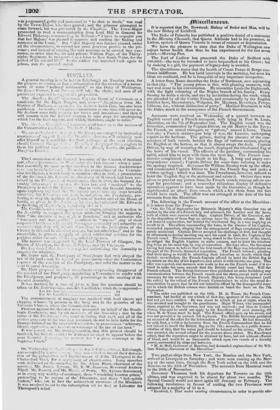Accounts were received on Wednesday of a quarrel between an
English vessel and a French transport, both lying in Port St. Louis, Mauritius, on the 7th of September last. The English vessel was the Greenlaw, commanded by Captain Driver, an old Master in the Navy; the French, an armed transport, or "gabare," named L'Iscre. There was also a French sixteen-gun brig of war, the Lamle; undergoing repairs in the harbour. The gabitre, during the absence of the com- manders of both vessels, hoisted the flags of various nations, placing the English at the bottom, so that it almost swept the deck. Captain Driver, by way of resenting the insult, displayed the tricoloured flag at the bows of his vessel. The officers of the garrison, commending his spirit, asked him to mess with them the next day. The French com- mauder complained of the insult to his flag. A long mad angry cor- respondence ensued ; Captain Driver for some time refusing to make the apology required. Governor Sir William Nicolay took up the affair, and commanded Captain Driver to hoist the French flag and make a written apology : which was done. The Frenchman, however, refused to hoist the English flag at the mainmast and salute it. Orders then were given to prevent any person from the French vessels coming ashore ex- cept for provisions ; and a somewhat ridiculous display of defensive operations appears to have been made by the Governor, as though he apprehended an attack front vessels which a few shots front the fort would have sunk. The affair was not arranged at the date of the last accounts from the Mauritius.
The following is the French account of the affair at the Mauritius: it is taken from the Temps— "On the 7th of September her Britannic Majesty's ship Greenlaw was at anchor by the side of a French brig and schooner, the Lancier and the Isere, both of which were covered with flags. Captain Driver, of the Gremlin*, saw in the disposition of these flags an outrage upon the British colours. He did not demand explanntion, but hoisted the tricoloured flag in a way implying an insult to it. The officer commending the Isere, in the absence of his Captain, demanded reparation, alleging that the arrangement of flags complained of was purely accidental. Captain Driver accepted the challenge at first, but thought
tit afterwards to decline meeting any save his equal in rank, the Captain of the
French vessel. The circumstances being stated to the Governor of the island, he obliged the English Captain to make excuses, and to hoist the tricolour flag twice on his mast-top, by way of repanttion. Six days after, the Governor having had reason to believe that the first insult of the flags was intentional on the part of the French, demanded reparation. The French refused; pleading that their doing so would be admitting their intention to insult, which they denied: nevertheless, the French Captain offered to hoist the British flag at his mizen on the day of his departure, and salute it with twenty-one guns. This offer was rejected, and menaces were made to fire on the French vessel if it re- fused to snake the same nmende that the British vessel had done. Still the French refused. The British Governor then published an order forbidding any communication between the French vessels and the shore, except such as were necessary for the service of his French Majesty; this being occasioned (said the order) by the refusal of the French Commandant to make the usual de- monstration to prove that he did not intend to offend by the disrespectful man- ner in which the British colours were hoisted on board the here on the 7th September. " The order was published on the lath. M. de Timm, the French Com- mandant, had landed at one o'clock of that day, ignorant of the order, which had not yet been notified. He was about to return at ten at night, when he was arrested and brought to the guardhouse. Major 'Wilson, who commanded there, repaired to the Governor, and was not received; and then to Colonel Power, who said he could not apply to his Excellency till next morning, till when M. de Titian must he kept. The French officer gave up his sword, and was not permitted to embark till daybreak. The British Governor published an account of the affair for the information of the garrison. Ile had demanded, he said, first, a written declaration from the French Commandant that Ise did not intend to insult the British flag on the 7th; secondly, as a public demon- stration of this, that the union jack should be hoisted on his mizen. The first was accorded, the second refused for the reasons above stated. His Excellency added, that the reparation might be obtained by force, but not without effusion of blood, and would be an inexcusable attack upon two vessels of a friendly power, surrounded by ships and batteries. "M. de Hell, Governor of Bourbon, had demanded explanations of Sir 'Wil- liam Nicoluy, Governor of the Mauritius."


























 Previous page
Previous page